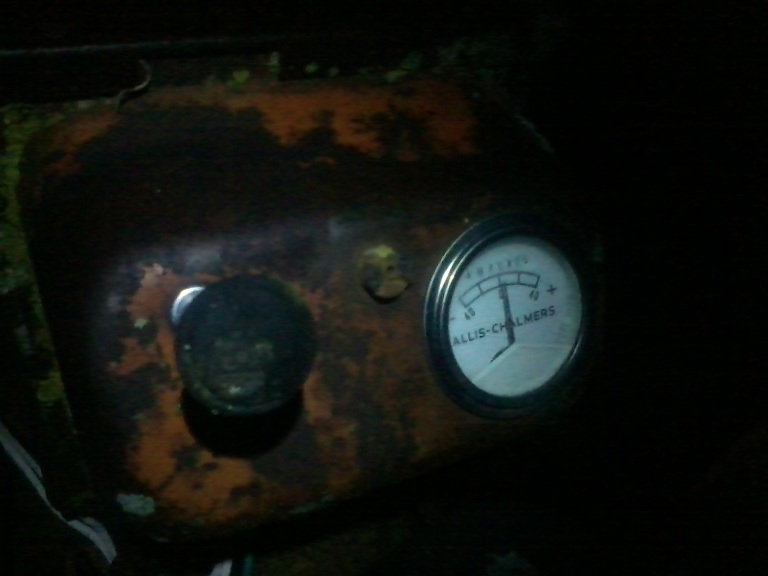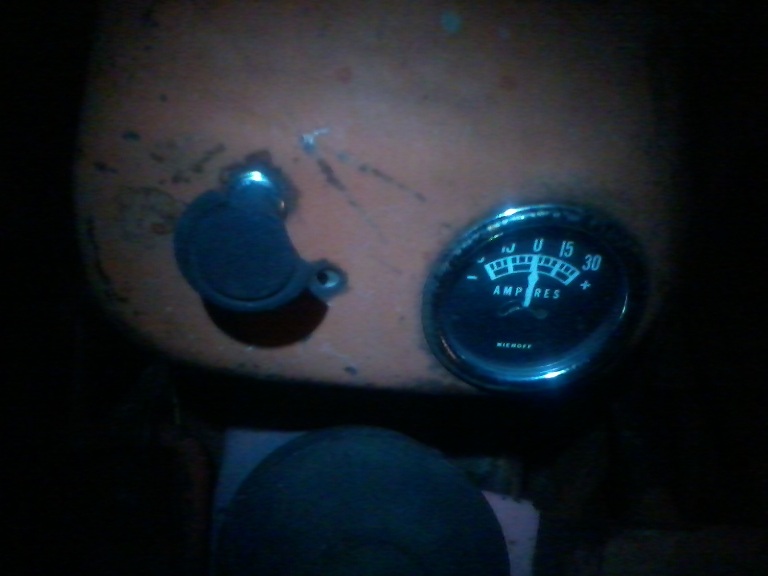Wd45 ammeter
Printed From: Unofficial Allis
Category: Allis Chalmers
Forum Name: Farm Equipment
Forum Description: everything about Allis-Chalmers farm equipment
URL: https://www.allischalmers.com/forum/forum_posts.asp?TID=153190
Printed Date: 18 Dec 2025 at 8:47pm
Software Version: Web Wiz Forums 11.10 - http://www.webwizforums.com
Topic: Wd45 ammeter
Posted By: Allis Wd45
Subject: Wd45 ammeter
Date Posted: 20 Aug 2018 at 12:55am
| My Wd45 currently has a 60 0 60 ammeter on it. It has been converted to 12V alternator. Should it have a 30 amp original Guage or volt. This ammeter don’t register charge or discharge but it is charging. |
Replies:
Posted By: DougS
Date Posted: 20 Aug 2018 at 3:14am
|
With an alternator you'd want a -60 0 +60 ammeter. Personally I'd install a voltmeter when using an alternator, but the ammeter will keep it looking somewhat original. Unless your ammeter is defective it should show a fairly high charge rate just after starting the tractor and then taper down to very little charge rate as the battery is charged up. With a fully charged battery an ammeter should show just an amp or two, which would almost look like zero on a 60 0 60 ammeter. A voltmeter should show around 14 volts regardless of the charged state of the battery. |
Posted By: Sugarmaker
Date Posted: 20 Aug 2018 at 3:27am
|
I use a volt meter and like it. Recommended by Steve(NJ) that knows way more about this stuff than I do. Have three tractors like that, 4th will have volt meter too. Yep not original but they work well! Regards, Chris ------------- D17 1958 (NFE), WD45 1954 (NFE), WD 1952 (NFE), WD 1950 (WFE), Allis F-40 forklift, Allis CA, Allis D14, Ford Jubilee, Many IH Cub Cadets, 32 Ford Dump, 65 Comet. |
Posted By: jaybmiller
Date Posted: 20 Aug 2018 at 6:32am
|
ah, the 'great gauge debate'..... 'technically' the ammeter only needs to be a bit higher in rating than the alternator output. If you have a 40 Amp alternator a +- 45 amp gauge is fine. One problem is alternators look the same but can have way different capacities.IE a 120Amp unit looks same as a 30 amp one, so you need to know what you've got. I've got CS-130 ,40A units in all 3 D-14 with +-30 gauges. The needles never 'peg'. That would occour with a very low cap battery, but then it'd not have enough juice to start, hmm... An ammeter shows the charge or discharge of the system, whether or not the battery IS being filled up with electrons. A voltmeter doesn't and one problem is that an alternator can output 14 volts but only say 1 or 2 amps. The voltmeter says 'OK' but there's no electrons in the battery so next time you try to start, 'dead battery' usually 1,000 feet from the nearest plug.... If there's only got one hole in the dash, I put in an ammeter. Since the TB gauge is kaput, I tossed a voltmeter in one of the D-14s,though I seldom look at it. We've all probably got a few battery powered drills where they have LEDs that say 'fully charged' but don't last more than a few minutes. The circuit only looks at voltage and NOT capacity. In the ideal World, you'd measure both and do 'load tests' often ,feed the data into a computer and get a real number as to the batteries condition ------------- 3 D-14s,A-C forklift, B-112 Kubota BX23S lil' TOOT( The Other Orange Tractor) Never burn your bridges, unless you can walk on water |
Posted By: Allis dave
Date Posted: 20 Aug 2018 at 6:58am
| Some of the guys don't like AMmeters because all of the current flows through them and causes a fire hazard. I think that hazard is real when in the dash of a car or new tractor. I'm not very worried about a fire in the little single gauge metal pod on my WD45 |
Posted By: DougS
Date Posted: 20 Aug 2018 at 6:59am
|
If the alternator is only capable of producing 2 amps and the battery is discharged to 50%, I can assure you that your voltmeter will not be reading 14 volts. If your ammeter is reading 2 amps, your battery may be charged or your alternator may be bad. You'll have to look farther with other equipment. If you have a voltmeter you can see somewhat what your battery voltage is just by turning the key on. If you have an ammeter it might show a slight discharge, which probably won't tell you much. If you have a voltmeter and it shows less than 12-ish volts it means your battery is either run down or kaput. If you know how to read a voltmeter it will tell you more than an ammeter. |
Posted By: Allis Wd45
Date Posted: 20 Aug 2018 at 9:07pm
| I’m thinking about just getting a -60 0 60 ammeter from Steiner because it has the allis chalmers on the face and will look more original. I know the voltmeter could be more useful but i like the idea of looking original. |
Posted By: JC-WI
Date Posted: 21 Aug 2018 at 2:11am
If I remember right, the WD ammeters were black faced gauges with Allis-Chalmers in white on them. And I think the WD45 were too. My 45 has a black faced Niehoff ammeter with a back lite face... and it got the gauge when converted to Alternator 30+ years ago.  ------------- He who says there is no evil has already deceived himself The truth is the truth, sugar coated or not. Trawler II says, "Remember that." |
Posted By: Allis Wd45
Date Posted: 21 Aug 2018 at 5:46pm
| JC- so if the gauges are supposed to have a black face and AC in white the replacement gauges aren’t even original replacements? |
Posted By: JC-WI
Date Posted: 21 Aug 2018 at 11:05pm
|
White works too, but the correct color was black. At the moment, this is the best I can do... If I didn't have the WD manual buried somewhere... I wouldn't have to use a CA pic.  ------------- He who says there is no evil has already deceived himself The truth is the truth, sugar coated or not. Trawler II says, "Remember that." |
Posted By: JC-WI
Date Posted: 21 Aug 2018 at 11:58pm
|
Back around 1965, dad went to the AC dealership and bought a new ammeter for the WD and it came out of the box with white face... LOL The parts man only stocked the white face gauges since the D series came out with them. Here are some poor pics in the dark just taken now. WD with white face gauge, and the WD45 with the Niehoff gauge. Should have pulled the light switch on for a lighted gauge picture.   They do look better than this in the daylight. Oh and the WD gauge is a 40 amp gauge and has the original 6 volt generator on it, and the WD45 has the 30 amp gauge with a Delco Remy Delcotron alternator.  Just pick the one you like the best and put it in...jmo
------------- He who says there is no evil has already deceived himself The truth is the truth, sugar coated or not. Trawler II says, "Remember that." |
Posted By: Steve in NJ
Date Posted: 22 Aug 2018 at 6:12am
|
Doug is right on. You get a short in the system and you have a late model Alternator up front doing the charging chores, doesn't matter what size instrument cluster you have, if there's a Ammeter in there and that load (short) ramps the Alternator up over the rating that Ammeter has, that Ammeter is the first to start cookin'. And, just take it from there till you get the Battery disconnected, cause there ain't gonna be much left. A fire under the gas tank and between your legs ain't cool. The solid state VR's in the newer Alts are very sensitive to load changes, and in miliseconds ramps the Alternator up. Alternators and Ammeters are like oil n' water. They don't mix well. Like Doug said, if you know how to read a Voltmeter, it can tell you a lot! Pretty simple. Pretty safe... mailto:Steve@B&B" rel="nofollow - Steve@B&B ------------- 39'RC, 43'WC, 48'B, 49'G, 50'WF, 65 Big 10, 67'B-110, 75'716H, 2-620's, & a Motorhead wife |
Posted By: Allis dave
Date Posted: 22 Aug 2018 at 6:48am
| I actually wired in a big inline fuse in mine. I don't remember, but if anything charges or discharges too fast, it should burn the fuse. |
Posted By: DougS
Date Posted: 22 Aug 2018 at 7:11am
|
Perhaps, Dave. Perhaps. Sometimes a sudden removal of a load from the alternator will cause an overvoltage spike from the alternator, which will cook the alternator. Today's cars use fusible links, which open more slowly and tend to prevent the overvoltage spikes. I'd recommend a fuse over nothing at all, but you do risk frying the alternator. |
Posted By: jaybmiller
Date Posted: 22 Aug 2018 at 8:19am
|
re: Today's cars use fusible links yeah and at LEAST 100 fuses !!! I had 3 in my 58 Willys 4WD and my 97 F150 must have 60-70 of them, all different sizes in 3 locations. The more electronics they stuff into today's rides the more fuses..... sigh Oh yeah D-14 has ONE.. though inline charge is a good idea(same as riders) ! ------------- 3 D-14s,A-C forklift, B-112 Kubota BX23S lil' TOOT( The Other Orange Tractor) Never burn your bridges, unless you can walk on water |
Posted By: JC-WI
Date Posted: 22 Aug 2018 at 10:06am
|
Steve You are the expert on wiring and the likes, but in my experiances, I have seen wires cooked and burnt and shorted out and the ammeter was not the one that fried... but have had a few ammeters that quit working...but didn't go smoking up. Had a battery blow under the hood of a tractor once, that was not a pretty sight either...but luckily nothing got set on fire. I have thought about doing what Allis Dave said about putting in a fuse in line... up by the alternator, and one at the post at the starter that feeds the dash. ------------- He who says there is no evil has already deceived himself The truth is the truth, sugar coated or not. Trawler II says, "Remember that." |